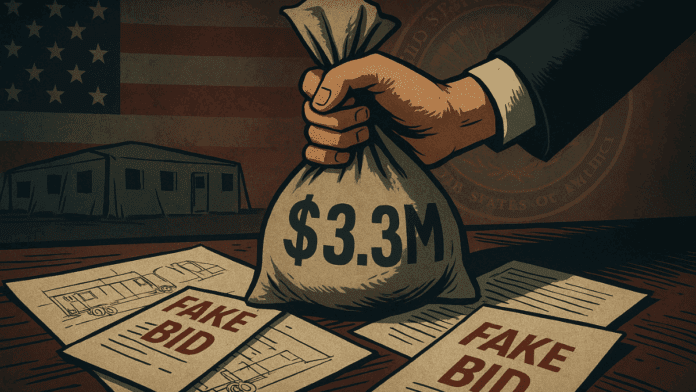Berg Companies Inc., a Spokane-based defense contractor, has agreed to pay $3.3 million to resolve accusations that it took part in a scheme to inflate the cost of military goods. The company, which builds rigid wall shelters for military use, was accused of helping manipulate the bidding process for government contracts through improper coordination with other vendors.
Inside the Scheme: How Berg Helped Rig Military Contracts
From 2019 to 2021, Berg worked alongside Noble Supply & Logistics, a Massachusetts-based prime vendor for the Defense Logistics Agency (DLA), and two other vendors to rig quotes on military contracts. The goal was to make it appear that fair competition took place, when in fact the process was secretly controlled to benefit preselected companies at inflated prices.
The shelters involved in these deals were supplied by Berg but awarded to partner vendors through manipulated bids. The contracts were part of the DLA’s Maintenance, Repair, and Operations (MRO) program, which is intended to reduce government spending by encouraging open competition among vendors.
According to the Department of Justice, this rigged process led to military units overpaying for 39 shelters in total—10 awarded to a vendor in New Mexico and 29 to a Florida-based vendor. Instead of cost savings, the government ended up footing higher bills because of the collusion.
Hong Kong’s SSI Hit with $876K Settlement Over Military Contract Violations
Federal Rules Bypassed Through Prearranged Bids
Under normal MRO contract rules, vendors are required to submit at least two competitive bids for purchases under $25,000 and three for orders above that. These guidelines are designed to protect taxpayer money and ensure fair pricing. However, the investigation found that Berg and the other vendors worked together behind the scenes to submit phony competing quotes, ensuring the award always went to a specific vendor.
This created a false appearance of a competitive process while the real decision had already been made in private. By doing this, Berg helped those vendors win contracts at higher rates and then sold its products to them at inflated prices.
Assistant Attorney General Brett Shumate of the Justice Department’s Civil Division said the arrangement hurt the government’s ability to secure the best products at fair prices. He described the scheme as anti-competitive and a misuse of taxpayer funds.
Leah B. Foley, U.S. Attorney for the District of Massachusetts, stated that the scheme directly undermined the goals of the MRO contracts, which were created to save the government money. She added that the settlement reflects the government’s determination to hold companies accountable when they manipulate procurement systems.
Justice Department busts $16M hospice fraud — BMWs, fake IDs, and stolen care funds
Whistleblowers Revealed the Fraud Behind the Scenes
The case came to light thanks to two whistleblowers: Mark G. Davis, a former salesperson for one of the involved vendors and an Army veteran, and Andrew G. Gunn, a managing director of a U.K.-based supplier for U.S. military needs. They filed a complaint under the False Claims Act’s qui tam provision, which allows individuals to report fraud against the government and receive a portion of the recovered money.
As a result of their role in exposing the scheme, Davis and Gunn will receive a $561,000 share of the settlement.
Multiple government agencies worked together on the investigation, including the Defense Criminal Investigative Service (DCIS), Army Criminal Investigation Division, Air Force Office of Special Investigations, and the General Services Administration Office of Inspector General (GSA OIG).
Chad Gosch, Acting Special Agent in Charge for DCIS, stated that protecting the integrity of Department of Defense contracts remains a top priority. Joseph Dattoria of GSA OIG added that uncovering and stopping fraud in federal contracting continues to be a key mission.
The legal case was managed by Trial Attorney Samson Asiyanbi of the Justice Department, along with Assistant U.S. Attorneys Sean Cunniff, Lindsey Ross, and Brian LaMacchia.
It is important to note that while Berg has accepted responsibility as part of the settlement, the claims remain allegations and there has been no formal court ruling on liability.
